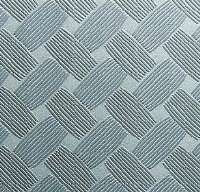- 0531-87887788
来源:/ 发布时间:2020-09-10
铝板是怎么进行氧化上色的呢?都有什么方法可以让金属铝氧化上色?正常情况下氧化铝板上色大的方面分为两种情况:人工着色和自然着色。人工着色又分为化学着色和电解着色。自然着色又分为合金发色和溶液发色。铝板生产厂家今天给大家一一分析讲解一下:
How is aluminum plate oxidized and colored? Is there any way to make aluminum oxide coloring? Under normal circumstances, there are two kinds of color on aluminum oxide board: artificial coloring and natural coloring. Artificial coloring can be divided into chemical coloring and electrolytic coloring. Natural coloring can be divided into Alloy Coloring and solution coloring. The aluminum plate manufacturer will give you an analysis and explanation one by one
第 一种情况是化学着色:将经过氧化处理的铝材浸入有机或无机染料溶液中,染料渗入氧化膜的孔隙,发生化学或物理作用而着色。化学着色设备简单,成本低,颜色种类多,但耐光、耐蚀性差,只适于室内装饰。
The first case is chemical coloring: the oxidized aluminum material is immersed in organic or inorganic dye solution, and the dye penetrates into the pores of the oxide film, causing chemical or physical reaction and coloring. Chemical coloring equipment is simple, low cost, and many kinds of colors, but it has poor light resistance and corrosion resistance, so it is only suitable for interior decoration.
第二种情况是电解着色:经过氧化处理的铝材,在单一金属盐或多种金属盐水溶液中,进行二次电解,在电场作用下,金属阳离子渗入氧化膜的孔隙中,并沉积在孔底,从而使氧化膜产生青铜色系、棕色系、灰色系以及红、青、蓝等色调。

The second case is electrolytic coloring: after the oxidation of aluminum, in a single metal salt or a variety of metal salt solution, the secondary electrolysis, under the effect of electric field, metal cations penetrate into the pores of the oxide film, and deposit at the bottom of the hole, so that the oxide film produces bronze, brown, gray, red, green, blue and other colors.
第三种情况是自然着色:铝材在阳极氧化的同时进行着色的方法。有合金发色法和溶液发色法。合金发色法是控制铝合金成分而获得不同的色调;溶液发色法也称为电解发色法,是控制电解液的成分和电解条件来控制色调的。实际生产中,自然着色一般都采用有机酸作为电解液,并加入少量硫酸以调节PH。
The third case is natural coloring: Anodizing and coloring of aluminum. There are alloy coloring method and solution coloring method. Alloy coloring method is to control the composition of aluminum alloy to obtain different hues; solution coloring method, also known as electrolytic coloring method, is to control the composition of electrolyte and electrolytic conditions to control the hue. In practical production, organic acid is usually used as electrolyte for natural coloring, and a small amount of sulfuric acid is added to adjust pH.
铝的氧化着色,采用人工方法使铝及其合金制品表面生成一层氧化膜(Al2O3)并施以不同的颜色,以提高铝材的耐磨性,延长使用寿命并增加色泽美观。氧化着色的基本工序为铝材表面处理、氧化、着色和随后的水合封孔、有机涂层等处理过程。
In order to prolong the service life of the aluminum alloy products, the aluminum oxide layer with different color is applied. The basic process of oxidation coloring is aluminum surface treatment, oxidation, coloring and subsequent hydration sealing, organic coating and other treatment processes.
铝的氧化铝的表面在自然条件下就保持一层10~100埃的氧化膜,人工氧化膜则是根据不同的目的使膜厚控制在0.5~250微米。人工膜生成的方法有化学氧化法和电化学氧化(即阳极氧化)法。
Under natural conditions, the surface of aluminum oxide keeps a layer of 10-100 angstrom oxide film, while the artificial oxide film is controlled within 0.5-250 μ m according to different purposes. There are chemical oxidation and electrochemical oxidation (i.e. anodic oxidation) methods for the formation of artificial membranes.
化学氧化将表面净化处理后的铝或铝合金在含有氧化剂和活性剂的氧化溶液中进行化学反应,形成一层氧化膜。活性剂的作用是使氧化膜在生成过程中部分溶解,产生孔隙,使氧化继续进行,氧化膜得以增厚。氧化溶液的种类很多,常以铬酸盐为氧化剂,碳酸盐为活性剂。
Chemical oxidation is the chemical reaction of surface purified aluminum or aluminum alloy in the oxidation solution containing oxidant and activator to form an oxide film. The role of the activator is to make the oxide film partially dissolved in the formation process, resulting in pores, so that the oxidation continues and the oxide film can be thickened. There are many kinds of oxidation solutions, usually using chromate as oxidant and carbonate as active agent.
阳极氧化通常在硫酸、草酸或铬酸等电解质溶液中进行。以铝作阳极,铅等金属作阴极,在直流电场的作用下,阴离子(OH)向阳极移动,并在阳极产生新生氧与作为阳极的铝作用,生成氧化膜。在电解液中酸可局部溶解氧化膜,产生孔隙,使氧化反应得以向纵深发展。此法使铝的表面形成多孔结构,可进行各种着色处理,并可作为喷漆底层。
Anodizing is usually carried out in electrolyte solutions such as sulfuric acid, oxalic acid or chromic acid. Under the action of direct current electric field, the anion (OH) moves to the anode, and produces new oxygen on the anode and reacts with aluminum as anode to form oxide film. In the electrolyte, the acid can partially dissolve the oxide film and produce pores, which makes the oxidation reaction develop in depth. This method can form porous structure on the surface of aluminum, which can be used for various coloring treatments and can be used as paint primer.